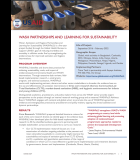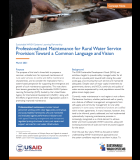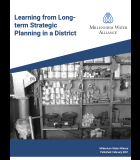USAID recognizes that strong local systems are needed to maintain functional water and sanitation services and that daunting challenges are associated with sustaining these services over time. The Sustainable WASH Systems (SWS) Learning Partnership was developed through a co-creation process and demonstrates the power of collaborative, iterative design. SWS brings together the collective expertise of its eight consortium members—University of Colorado Boulder, Environmental Incentives, IRC, LINC, Oxford University, Tetra Tech, WaterSHED, and Whave—to apply systems approaches to challenges that USAID implementers are facing in the field as they work to strengthen the sustainability of WASH services.
SWS’s systems approach starts with bringing together a broad network of local stakeholders to work toward a shared vision. In 2017, SWS consortium members IRC, Tetra Tech, and LINC put this approach into practice in Ethiopia, in two rural districts and one small town. They identified NGOs and public, academic, and private-sector institutions that actively contribute to the provision of WASH services to participate in a “Learning Alliance,” a forum to increase collaboration and knowledge sharing among stakeholders in each locale. SWS then conducted three separate Organizational Network Analyses to assess the relationships among organizations in each Learning Alliance and to provide a basis for understanding and strengthening their networks. For example, in the Mille district, NGOs showed limited engagement with district governments. As a consequence, NGO–supported water infrastructure projects often fall into disrepair due to lack of coordination with government offices that could otherwise help provide ongoing maintenance. This insight suggests that the Mille Learning Alliance could improve service sustainability by developing an action plan for improving relationships between NGOs and district government offices. SWS partners conducted similar exercises in Cambodia, Kenya, and Uganda. Moving forward, SWS will continue to explore findings from these network analyses to better inform where and how to strategically provide support to Learning Alliances and other stakeholder networks.
SWS’s learning process is designed to generate evidence on the effectiveness and potential future applications of systems approaches. By generating knowledge and engaging with key actors, SWS fosters learning among local governments and actors to improve services, and provides USAID and other development partners with knowledge of how to work with local systems to sustain WASH services.






